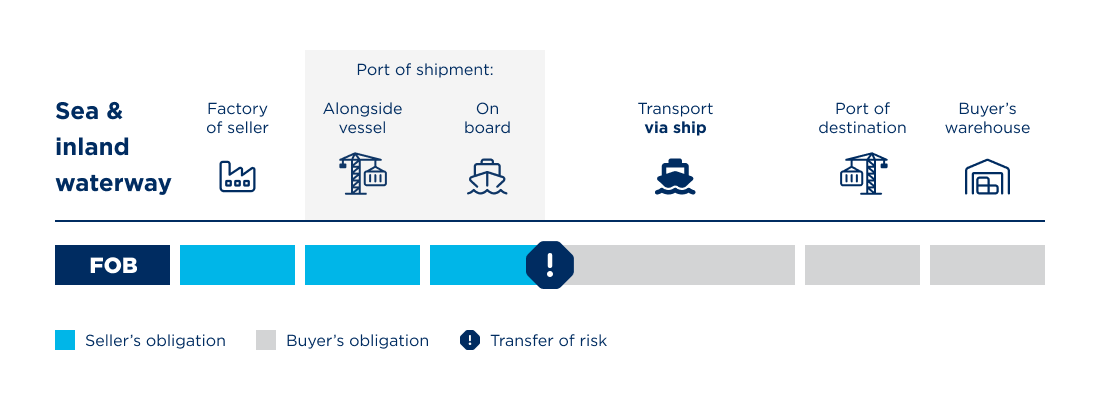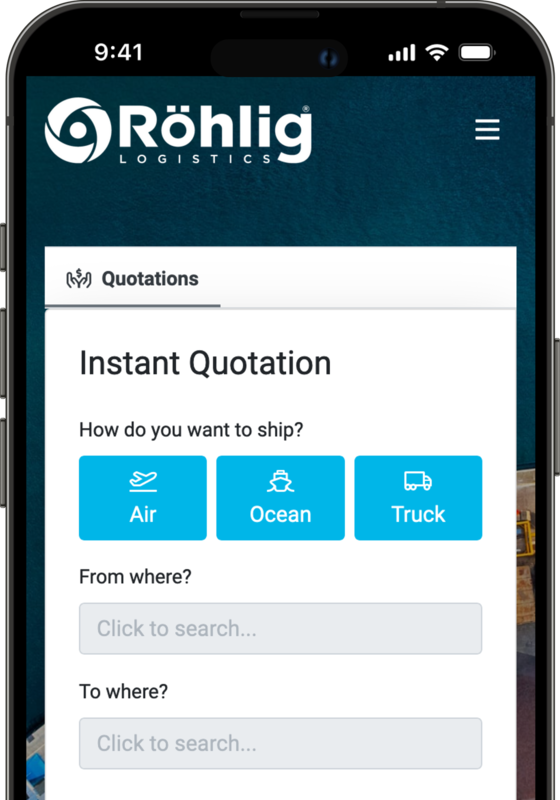The FOB Incoterm is one of the earliest Incoterms and has been widely used since 1936. Of course, there have been certain adaptations over the years, but the basic principle has remained the same: FOB delivery means that goods are considered delivered when the seller has loaded them onto a ship designated by the buyer. At this point, the risks and costs are transferred to the buyer. Obviously, the FOB Incoterm is intended for inland and maritime shipping.
FOB Defined: Which freight to use?
With the FOB Incoterm, the seller is expected to load the goods onto the ship designated by the buyer. This is possible with bulk goods or general cargo, for example. However, in the case of containers intended for a container ship, these are placed in the care of the terminal responsible. This means that the seller loses control of the goods, but is also responsible for delays or damage. Therefore, FOB (just like FAS) is not recommended for container transport (unless the container is loaded directly onto a conventional cargo ship).
FOB Delivery Point
The seller must bring the goods onboard the ship when using the FOB Incoterm or procure them for the buyer if the goods have already been delivered - for example as part of a sales chain in commodity trading. Ideally, the seller specifies exactly at which port and at which loading point the goods are to be loaded onto which ship. If no loading point is specified, the seller chooses it at their own discretion. Either an exact date or a period of time can be specified as the time of delivery. In the latter case, the buyer then has the option of later specifying a concrete delivery date within this period and doing so in a ‘reasonable manner’, i.e. with sufficient time for the seller to respond. If the delivery has been carried out by the seller in accordance with the contract, the buyer or a person authorised by the buyer must take delivery of the goods.
Caution: By agreeing a fixed delivery date, the transaction can take on the status of a firm deal under the German Commercial Code, with corresponding rights for the buyer if the delivery deadline is not met (e.g. compensation for damages or cancellation of the purchase).
Transfer of risk with FOB
The risk is also transferred to the buyer upon delivery. The exact moment of the transfer of risk occurs when the goods touch down on the loading deck or the ship's planks. In earlier times, crossing the railing was used as the transfer of risk, but this could lead to disputes. The current wording ‘on board the ship’ as the time of delivery is clearer here.
The seller's duty of care must be observed, which makes them responsible even after the transfer of risk. If, for example, packaging that is not suitable for transport leads to problems later on, the seller is liable for the consequences of the damage. This is also in line with the Vienna UN Convention on Contracts for the International Sale of Goods (CISG).
Transport costs for FOB shipping
The seller bears the risk and costs of transporting the goods until they are loaded onto the named transport ship or the seller provides the buyer with the goods already delivered in this way. From this point onwards, the buyer generally bears the costs and risks of onward transport.
Depending on the situation, it may make sense for the buyer to ask the seller to conclude a transport contract. Sometimes it is even common commercial practice for the seller to take care of the conclusion of a transport contract at the risk and expense of the buyer, unless the buyer vetoes this in good time and takes over this part.
FOB Incoterm: Insurance
In principle, the FOB Incoterm does not oblige the parties involved to take out insurance, but this is of course advisable. The seller bears the risk until the goods are on board, after which the buyer is responsible. In principle, the seller and buyer would only have to insure ‘their’ part of the risk (i.e. with two separate insurance policies). However, as it is not always easy to determine the exact moment when damage occurs, the respective insurers may try to place responsibility on the other party. However, if the buyer and seller only take out one insurance policy and share the costs fairly, this problem can be avoided.
FOB: Export, transit and import
If customs borders have to be crossed when transporting goods, the seller takes care of all formalities relating to export (licences, formalities, security clearances, goods inspections, etc.). The buyer is responsible for the import and any transit via transit countries. Both parties are obliged to provide the other party with the necessary information and documents if required.
As soon as the seller has delivered the goods onboard the named ship in accordance with the contract - or has procured the existing goods - the costs and risk are transferred to the buyer. Put simply, as soon as the goods touch down on the planks or deck of the ship, the buyer is responsible. From now on, they pay for the further transport and bear the risks involved. Either the buyer organises the transport themselves, or - as is often the case - they commission the seller to do so (but at their own expense).
The traditional Incoterm FOB, which is used exclusively for inland and ocean shipping, is best suited to general cargo and bulk goods. The problem with containers in connection with the Incoterm FOB (and likewise FAS) is that the seller does not control and manage the handling of the container themselves. Instead, they leave the container at the terminal. The seller also has no control over the provision of goods for an LCL container and the subsequent logistics processes. However, as they still bear the risk until the goods are onboard, it is in the seller's interest to choose a different Incoterm.
With genuine FOB, the exporter delivers the goods to the ship export-free and assumes all customs and export formalities as well as all costs up to this point. From this point onwards, the importer determines the further course of transport and is responsible for it. The buyer concludes the transport contract at their own expense.
In the case of non-genuine FOB, on the other hand, the seller instructs their supplier to handle the shipment, including the transport contract and the costs incurred. This is often referred to as ‘FOB shipped’. Here too, please only agree a genuine FOB as regulated by the ICC.


